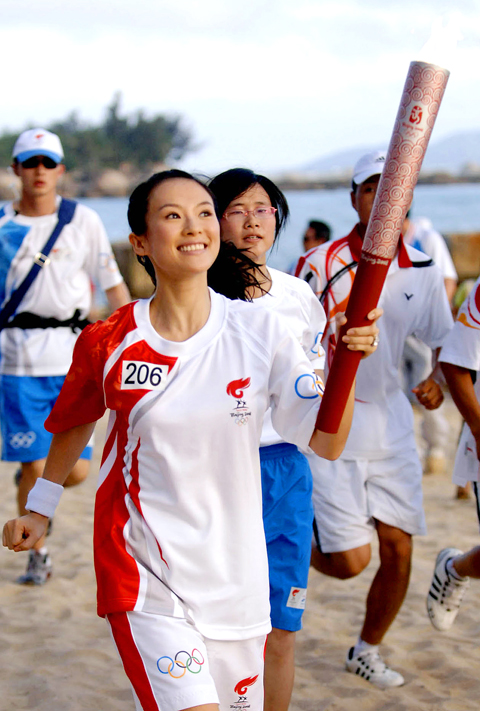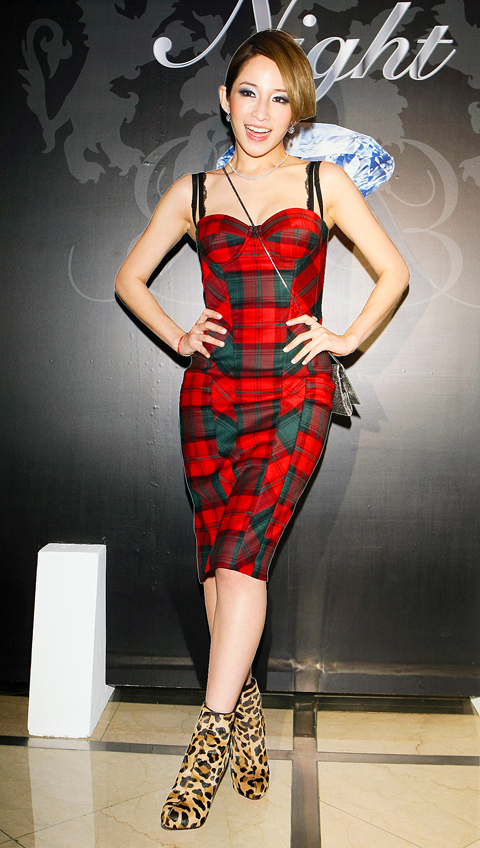The Olympic torch landed in China last week and the glitterati were among the torchbearers. These included Andy Lau (劉德華), Kelly Chen (陳慧琳), Zhang Ziyi (章子怡), Jackie Chan (成龍) and Emil Chow (周華健).
The stars unanimously said it was a great honor to be part of an ancient ceremony that spreads the message of peace and love. (Actually, it’s not an ancient ceremony. The torch relay was invented by the Nazis to promote their Aryan ideals at the 1936 Berlin Olympics.) But Jackie Chan and company have to know about China’s bloody crackdown in Tibet and the demonstrations held by pro-Tibet and human rights activists across the globe.
To be fair, the damage these stars would suffer to their careers if they offended Beijing would be much greater than that faced by Steven Spielberg or Richard Gere. Still, Pop Stop thinks the stars can go overboard in their support for China’s authoritarian regime. Anyone remember the movie Hero (英雄)?

PHOTO: TAIPEI TIMES
Also using China as a stage is former local pop diva Elva Hsiao (蕭亞軒), who is attempting to reenter showbusiness after signing with EMI last month in Beijing. Following the deal she did a commercial shoot in Shanghai that reportedly earned her more than NT$20 million. Rumors about the man-magnet’s latest romance promptly did the rounds.
Reports surfaced last week that Hsiao was the guilty third party standing between top model-turned movie-star wannabee Lin Chih-ling (林志玲) and her sweetheart Scott Qiu (邱士楷), heir to the HCG corporation (和成集團), which sells toilets and other bathroom equipment. The reliable source was said to be a Chinese man named Li Jianjun (李建軍), who is reportedly blessed with supernatural powers. Qiu sought his advice on the menage a trois.
Meanwhile, Hsiao responded to eager press inquiries by saying: “the toilet I use at home is a TOTO, not an HCG.” Lin’s reply: “Well, my family and I use HCG toilets.”

PHOTO: TAIPEI TIMES
It’s reassuring to know that Taiwan’s top model is in fact a mere mortal and answers the call of nature like the rest of us.
Answering to a different call of nature, foppish plastic surgeon Li Jin-liang (李進良) has made up with his starlet wife Hu Ying-zhen (胡盈禎), also known as the daughter of entertainer Hu Gua (胡瓜). Readers will recall that local paparazzi caught Li visiting a hostess bar and love motel with a group of men and women last month that did not include Hu.
The honey-I-am-sorry gift was a pair of shoes that cost NT$3,480 and also conveniently doubled as a Mother’s Day present. Apparently Li is able to get away with more and more as Hu’s role morphs from girlfriend to wife to baby mama. In 2003, he dropped NT$20,000 on a Labrador retriever because he played away from home and in 2006 he bought a pricey Tiffany necklace to make up for spending a night with porn star Hinano Miduki (觀月雛乃). Now he just has to buy a lousy pair of shoes. In Pop Stop’s view this would hardly suffice for saying sorry for not doing the laundry, let alone embarking on a sexual safari.

Behind a car repair business on a nondescript Thai street are the cherished pets of a rising TikTok animal influencer: two lions and a 200-kilogram lion-tiger hybrid called “Big George.” Lion ownership is legal in Thailand, and Tharnuwarht Plengkemratch is an enthusiastic advocate, posting updates on his feline companions to nearly three million followers. “They’re playful and affectionate, just like dogs or cats,” he said from inside their cage complex at his home in the northern city of Chiang Mai. Thailand’s captive lion population has exploded in recent years, with nearly 500 registered in zoos, breeding farms, petting cafes and homes. Experts warn the

The unexpected collapse of the recall campaigns is being viewed through many lenses, most of them skewed and self-absorbed. The international media unsurprisingly focuses on what they perceive as the message that Taiwanese voters were sending in the failure of the mass recall, especially to China, the US and to friendly Western nations. This made some sense prior to early last month. One of the main arguments used by recall campaigners for recalling Chinese Nationalist Party (KMT) lawmakers was that they were too pro-China, and by extension not to be trusted with defending the nation. Also by extension, that argument could be

Aug. 4 to Aug. 10 When Coca-Cola finally pushed its way into Taiwan’s market in 1968, it allegedly vowed to wipe out its major domestic rival Hey Song within five years. But Hey Song, which began as a manual operation in a family cow shed in 1925, had proven its resilience, surviving numerous setbacks — including the loss of autonomy and nearly all its assets due to the Japanese colonial government’s wartime economic policy. By the 1960s, Hey Song had risen to the top of Taiwan’s beverage industry. This success was driven not only by president Chang Wen-chi’s

Last week, on the heels of the recall election that turned out so badly for Taiwan, came the news that US President Donald Trump had blocked the transit of President William Lai (賴清德) through the US on his way to Latin America. A few days later the international media reported that in June a scheduled visit by Minister of National Defense Wellington Koo (顧立雄) for high level meetings was canceled by the US after China’s President Xi Jinping (習近平) asked Trump to curb US engagement with Taiwan during a June phone call. The cancellation of Lai’s transit was a gaudy